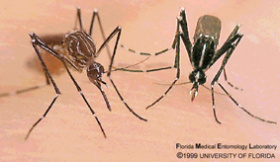About the project
Zika Mozzie Seeker is a citizen science project from Metro South Health. We work with people in our community to check our yards for invasions by Zika mozzies - Aedes aegypti and Aedes albopictus.
Zika mozzies don’t fly very far from their breeding sites. So even if we don’t find any Zika eggs in your neighbour’s trap, it doesn’t mean there’s none in your yard or suburb. The more people collecting eggs, the more confident we’ll be that we don’t have Zika mozzies in the Metro South area.
Find out if your suburb is in the collection area and how many households are taking part [PDF 330.26 KB].
This is an ongoing project and since 2017, we’ve collected over half a million eggs from nearly 5,000 traps in 172 suburbs. The great news is these all tested negative for Zika mozzies.
Our goals are to:
- increase community knowledge about urban mosquitoes and the diseases they can carry
- encourage people to be citizen scientists and prove Zika mozzies aren’t in their back yard
- use the results to create an early warning network that increases our confidence that Zika mozzies haven’t invaded Metro South.
Our project was a finalist for the 2018 and 2019 Australian Museum Eureka Prize for Innovation in Citizen Science. These nominations are thanks to all the people that have got involved.
You can find out more about citizen science on the Office of the Queensland Chief Scientist’s website or watch our video about becoming a Zika Mozzie Seeker.
About Zika mozzies
Zika mozzies don’t live in the Metro South area, but they do live in other parts of Queensland and many cities overseas. If they go undetected, they’ll invade our South East Queensland suburbs. This is bad news for the future health of our cities because Zika mozzies can carry exotic viruses not found in Australia – for example Zika, dengue and chikungunya viruses.
Where they breed
Zika mozzies breed in backyard containers that can hold water for more than a week, such as:
- bird baths
- buckets
- flower pot saucers
- tyres (no rims)
- rainwater tanks with defective screening.
Zika mozzies aren’t found in swamps or drains. They stick their eggs to the insides of containers that have water in them. Dry eggs can survive for months, which is how Zika mozzies can invade if those containers travel long distances within and between countries.
The adults don’t fly far – about 500 metres, from their breeding sites (containers of water). This makes it difficult to detect a small or recent invasion in a large region like Metro South. This is why we need a lot of people from all our suburbs to help collect mosquito eggs twice a year.
Mosquito bites
Female Zika mozzies are unusual because they’ll bite people during the day. Aedes aegypti mosquitos will bite you inside your house and bites often go unnoticed. Aedes albopictus mosquitos will bite you outside your house and the bite is painful.
Mosquito bites can cause the spread of diseases. Learn about mosquito borne diseases and how to prevent mosquito bites on Queensland Government websites.
Help us check for Zika mozzies
Twice a year we invite the community to set up a mosquito egg trap (ovitrap). These are called rounds. We do one from November to December, and another one from March to April, when there’s more mozzies around.
Once you register, we’ll send you an egg collection kit with instructions on how to set it up. We’ll also send you a few SMS reminders, so you know when to check your kits for mosquito eggs.
When you send your trap back, we count your eggs and send them to Queensland Health's Public and Environmental Health Reference Laboratories for testing. Our tests screen each batch for traces of Zika mozzie DNA.
We’ll send you the results by SMS before publishing them as a heat map on this website.
What we’re looking for
We’re looking for 2 invasive urban mosquito species that live in other parts of Queensland and overseas. We call them Zika mozzies.
- Aedes aegypti is also known as the 'Yellow fever mosquito' and the 'dengue mosquito' which can be found in most parts of Queensland
- Aedes albopictus is also known as the 'Asian tiger mosquito' and can be found on many Torres Strait islands.
What they look like
Adult Zika mozzies are similar in size to most other mosquitoes - a microscope helps tell the difference.
The Yellow fever mosquito (Aedes aegypti) is often brown with a unique white ‘lyre-shaped’ pattern on its back between the wings and has striped legs and body.
The Asian tiger mosquito (Aedes albopictus) is black, with a single white stripe on its back, and also has striped legs and body.

Who can take part
You can take part if you live in Metro South, which includes the following areas:
- Brisbane - suburbs on the southside of Brisbane River
- Logan - all suburbs
- Redland - all suburbs
- Beaudesert and eastern parts of the Scenic Rim region.
Check for your suburb on our area and boundary map [PDF 2166.85 KB] or in the table on the registration page.
Order your free kit
Use our online form to register for our next round in November 2024. This will be round 15.
We’ll send you the kit closer to that time. If you registered for the last round, you don’t need to register again.
Find out how to set up your kit
Contact us
If you’d like to know more about our project, you can email MSPHU-Med-Ent@health.qld.gov.au.